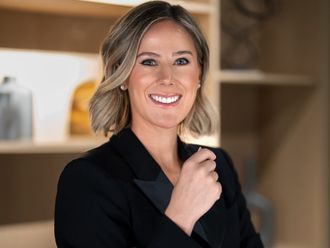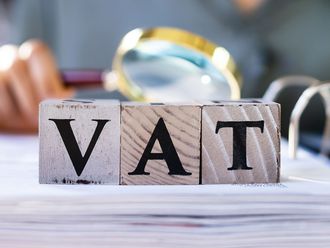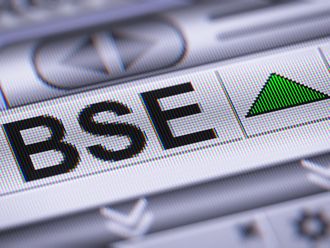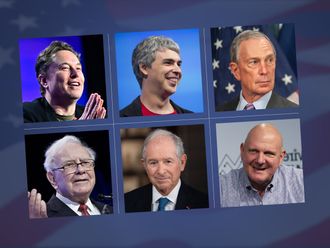Everywhere I go, I'm deluged with business ideas — but ideas for products that will help our society address the problem of climate change just can't come fast enough. Climate change poses a serious challenge to business, and business must be part of the solution.
Some companies have already implemented new standards focused on the need to reduce, reuse and recycle, but change is not progressing nearly fast enough. We will need advanced technologies and clean energy alternatives in order to meet our goal of cutting carbon emissions in half, which is what we must do to slow the process of climate change. But we haven't developed a fraction of the new products our society needs to avoid disaster: ultra-efficient water heaters, improved refrigeration and freezers, advanced building materials and rainwater harvesting — the list is long.
Some terrific products have, however, already emerged. Smart windows that can automatically increase or decrease translucency to maintain comfortable temperatures. Super-efficient LED lighting. Energy-saving improvements in building design. Sensor technology that helps us to use scarce resources more wisely.
Next-generation hybrid cars that emit less pollution are already in use. Entrepreneurial ventures are developing technologies that capture carbon from the burning of coal and natural gas. Parabolic mirrors, deployed in Africa's deserts, are providing green electricity. Many such excellent schemes have been evaluated by Virgin's Investment Advisory Committee. We see real opportunities in this field, and have invested in a few.
Feedstock
One of the keys to saving our environment is to create cleaner fuels that do not emit carbon dioxide when burned. For a biofuel to be a viable alternative to gasoline, there must be massive amounts of feedstock available — the raw material needed for the manufacturing of the liquid fuel — and the finished product has to be equal in price to, or cheaper than, traditional fuels. The primary types of feedstock for the production of renewable fuel are sugarcane and corn (the latter is the source of most ethanol sold in the US). In Asia, tapioca, potatoes and other starches can also be used. But I cannot see the benefit in growing food and using it for energy when people around the world are starving and basic food prices are rising.
Our studies found that cellulosic biomass is a better alternative, as is waste from agriculture, municipal sewage and animals. Prairie grass, willows, corn stalks and wheat straw all can be used to manufacture cellulosic ethanol. Our research led the Virgin Green Fund to make an investment in Gevo, a world-class biofuels company that converts biomass into butanol. But this is a possible biofuel source for countries with large prairie areas, not necessarily for the entire world. On the islands of Vanuatu in the Pacific Ocean, an Australian entrepreneur, Tony Deamer, has succeeded in using coconut oil in fuel for motor vehicles. Potentially, this enterprise could help to revitalise the declining market for copra, or coconut flesh, and would have wide-ranging environmental benefits as well.
The sheer labour of breaking into coconuts and scooping out the flesh makes them unsuitable as a feedstock to supply the world biofuel market. Coconut oil is, however, an excellent local solution.
Suite of solutions
The scientists and entrepreneurs working in this field do not have to find a single biofuel that will do everything for everyone. What we can and should develop is a suite of solutions that work well in different places, for different purposes, and at different scales. We should then be able to dramatically reduce carbon emissions by introducing bio-ethanol for general use in cars and buses.
The challenge is to develop local biofuels that will scale up to supply a given market, that do not damage the atmosphere, do not lead to deforestation, and do not consume vital food stocks that the world's growing population will need to eat.
That work is under way. Imperium Renewables has opened one of the world's largest biodiesel refineries at Grays Harbour, in Washington state. It's capable of producing up to 100 million gallons of biofuel per year. While this facility primarily uses canola grown in the Pacific Northwest and Canada, soy, and many other crops, John Plaza, president and CEO of Imperium, is overseeing the development of a biofuel that can be used in jets, harvesting algae which can be grown in fresh or sea water.
Many people are looking to government and nonprofit groups to resolve the challenges we face. But given our rapidly rising population and the consequent environmental pressure, our solutions have to be technological as well as social — business must be a part of this equation as well. Entrepreneurs can and should work for the greater good, by developing products that address our society's greatest problems: that save the planet, create jobs, and foster ecological diversity.
Richard Branson is the founder of the Virgin Group and companies such as Virgin Atlantic, Virgin America, Virgin Mobile and Virgin Active.












